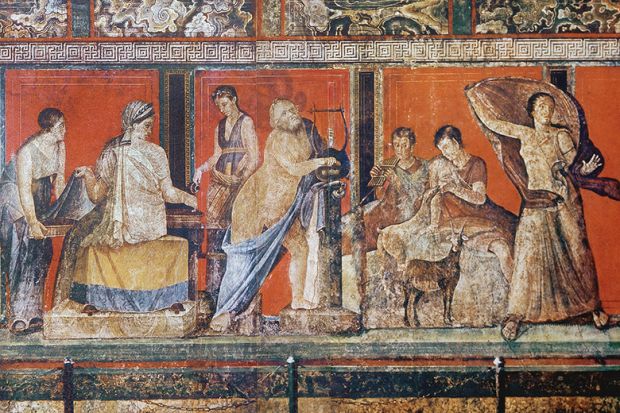This is a most readable and enjoyable overview of religion in the Roman Empire that focuses on Judaism, polytheism and Christianity. Robert Knapp, a retired classicist at the University of California, Berkeley, uses the term polytheism instead of paganism, even while recognising that neither Judaism nor Christianity was strictly monotheistic.
The conventional approach to these religions is to treat them separately, and especially to pit Judaism against polytheism. Knapp does the opposite. While scarcely levelling them, he emphasises the similarities over the differences. He sees the three as kindred responses to everyday desires and woes. Everybody worried about food, illness and sheer survival. Life was hard. In this, Knapp’s view of religion parallels that of Bronisław Malinowski.
People turned to their gods to supplement their own limited powers to control the world. The gods were far from uniformly reliable, but they seemingly came through often enough to be indispensable. There were few atheists. Knapp rejects the simplistic view that where Jews could count on their God, who was unfailingly just and predictable, polytheists could not. He does not see Judaism through the eyes of the Book of Proverbs and polytheism through the eyes of the Book of Job.
Polytheists and Jews alike gave their gods prayers and sacrifices. At the same time, both groups gave their gods ethical obedience. They wanted to know how they should live. Knapp spares us the caricature that the Jewish God wanted ethical obedience and the polytheistic gods only sacrifices, and in this accords with the classicist Hugh Lloyd-Jones in The Justice of Zeus (1971). But such stereotypes still hold in the study of religion, where, for example, Judaism is the religion deemed ritualistic, and is contrasted to a superior, ethical Christianity.
Jews no less than polytheists practised magic as well as religion, as Knapp shows. He does not abide by the long-discredited view, going back to J. G. Frazer, that magic works through impersonal, scientific-like processes rather than through gods. Jews, polytheists and Christians all resorted to whatever means they could find to realise their hopes. Equally, he continually notes the attribution of good fortune to miracles. None of the three religions considered itself above either miracles or magic.
Knapp repeatedly discusses philosophical religion, especially among polytheists. He is preoccupied with the differences between the religion of the elite and the religion of ordinary persons, for whom he expresses particular sympathy. He then notes that Christianity, once established, also took a philosophical turn.
Judaism and Christianity believed in the future end of the world, whether imminent or eventual. Polytheism did not. The standard description of this difference is that of a linear versus a cyclical view of history.
In his final chapter, Knapp enlists the study When Prophecy Fails (1956) by social psychologist Leon Festinger and collaborators. Particularly valuable is Knapp’s discussion of the responses to two failures, that of the Jewish revolt against Rome and Jesus’ failure to return. But he misses Festinger’s key claim: that when religious predictions fail, adherents do not merely rationalise away failures but also seek converts. The more people who believe something, the more persuasive that belief is. Nevertheless, this is an excellent book overall.
Robert A. Segal is sixth century chair in religious studies, University of Aberdeen, and author of Myth: A Very Short Introduction (2015).
The Dawn of Christianity: People and Gods in a Time of Magic and Miracles
By Robert C. Knapp
Profile Books, 320pp, £25.00
ISBN 9781781252079
Published 13 April 2017
Register to continue
Why register?
- Registration is free and only takes a moment
- Once registered, you can read 3 articles a month
- Sign up for our newsletter
Subscribe
Or subscribe for unlimited access to:
- Unlimited access to news, views, insights & reviews
- Digital editions
- Digital access to THE’s university and college rankings analysis
Already registered or a current subscriber?




